新视野大学英语读写教程2_第6单元课件
- 格式:ppt
- 大小:16.05 MB
- 文档页数:76
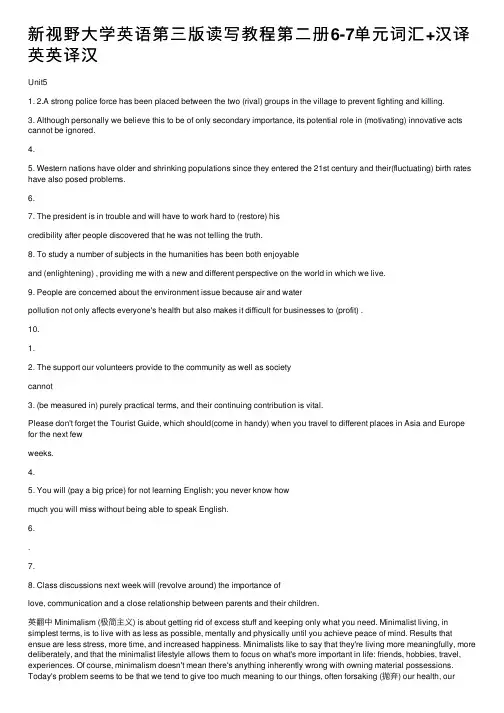
新视野⼤学英语第三版读写教程第⼆册6-7单元词汇+汉译英英译汉Unit51. 2.A strong police force has been placed between the two (rival) groups in the village to prevent fighting and killing.3. Although personally we believe this to be of only secondary importance, its potential role in (motivating) innovative acts cannot be ignored.4.5. Western nations have older and shrinking populations since they entered the 21st century and their(fluctuating) birth rates have also posed problems.6.7. The president is in trouble and will have to work hard to (restore) hiscredibility after people discovered that he was not telling the truth.8. To study a number of subjects in the humanities has been both enjoyableand (enlightening) , providing me with a new and different perspective on the world in which we live.9. People are concerned about the environment issue because air and waterpollution not only affects everyone's health but also makes it difficult for businesses to (profit) .10.1.2. The support our volunteers provide to the community as well as societycannot3. (be measured in) purely practical terms, and their continuing contribution is vital.Please don't forget the Tourist Guide, which should(come in handy) when you travel to different places in Asia and Europe for the next fewweeks.4.5. You will (pay a big price) for not learning English; you never know howmuch you will miss without being able to speak English.6..7.8. Class discussions next week will (revolve around) the importance oflove, communication and a close relationship between parents and their children.英翻中 Minimalism (极简主义) is about getting rid of excess stuff and keeping only what you need. Minimalist living, in simplest terms, is to live with as less as possible, mentally and physically until you achieve peace of mind. Results that ensue are less stress, more time, and increased happiness. Minimalists like to say that they're living more meaningfully, more deliberately, and that the minimalist lifestyle allows them to focus on what's more important in life: friends, hobbies, travel, experiences. Of course, minimalism doesn't mean there's anything inherently wrong with owning material possessions. Today's problem seems to be that we tend to give too much meaning to our things, often forsaking (抛弃) our health, ourrelationships, our passions, our personal growth, and our desire to contribute beyond ourselves. In addition to its application in people's daily life, minimalism also finds application in many creative disciplines, including art, architecture, design, dance, film making, theater, music, fashion, photography and literature.极简主义是指去掉多余的,仅保留需要的部分。
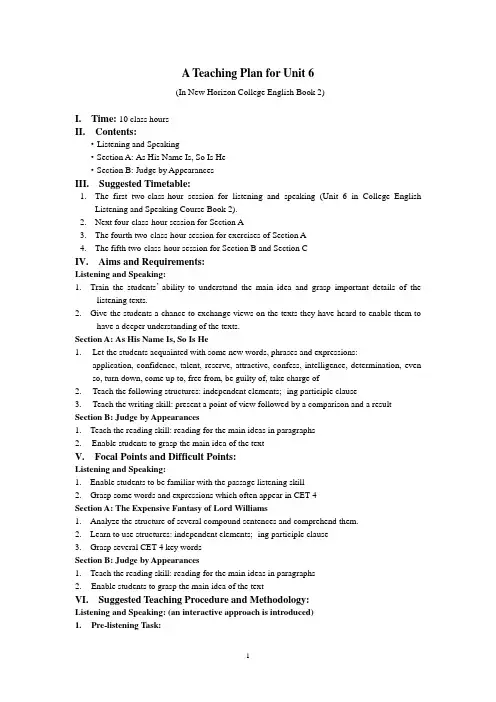
A Teaching Plan for Unit 6(In New Horizon College English Book 2)I. Time:10 class hoursII. Contents:·Listening and Speaking·Section A: As His Name Is, So Is He·Section B: Judge by AppearancesIII. Suggested Timetable:1.The first two-class-hour session for listening and speaking (Unit 6 in College EnglishListening and Speaking Course Book 2).2.Next four-class-hour session for Section A3.The fourth two-class-hour session for exercises of Section A4.The fifth two-class-hour session for Section B and Section CIV. Aims and Requirements:Listening and Speaking:1. Train the students’ability to understand the main idea and grasp important details of thelistening texts.2. Give the students a chance to exchange views on the texts they have heard to enable them tohave a deeper understanding of the texts.Section A: As His Name Is, So Is He1.Let the students acquainted with some new words, phrases and expressions:application, confidence, talent, reserve, attractive, confess, intelligence, determination, even so, turn down, come up to, free from, be guilty of, take charge of2.Teach the following structures: independent elements; -ing participle clause3.Teach the writing skill: present a point of view followed by a comparison and a result Section B: Judge by Appearances1. Teach the reading skill: reading for the main ideas in paragraphs2.Enable students to grasp the main idea of the textV. Focal Points and Difficult Points:Listening and Speaking:1. Enable students to be familiar with the passage listening skill2. Grasp some words and expressions which often appear in CET-4Section A: The Expensive Fantasy of Lord Williams1. Analyze the structure of several compound sentences and comprehend them.2. Learn to use structures: independent elements; -ing participle clause3. Grasp several CET-4 key wordsSection B: Judge by Appearances1. Teach the reading skill:reading for the main ideas in paragraphs2.Enable students to grasp the main idea of the textVI. Suggested Teaching Procedure and Methodology:Listening and Speaking: (an interactive approach is introduced)1.Pre-listening Task:Arrange the students in pairs and ask them to talk about the following questions:①Do you have friends or relatives that work in a business company? What is it like to workthere?②Would you like to work in a business company after you graduate? Why or why not?③What do you think is more important in getting a job, education background or experience?④What qualities are needed to get a promotion in a company?Some key words and expressions in Language Focus:sentimental: a. showing much tender feeling rather than reasonable or practical judgment;emotionaldynamic: a. full of energy, new ideas, the will to succeed, etc; forceful, energeticknow the ropes: (informal) know how to do a particular jobput one’s name forward: apply for a position that is open2.Background Information:People working in a company all dream of promotion. It usually takes two or three years for an entry level clerk to get promoted to a junior level position. But one may have to wait much longer (sometimes as long as 10 years or more or never) for a promotion to a middle management position. When a position is open, employees who think themselves qualified for the job can put their names forward as candidates. The management will then discuss their strength and weaknesses to make a decision as to whom to promote.3.Listening to text 1 and 24.Speaking Tasks: ask the students to get into pairs and explain to them how to carry outSpeaking Task A, then select a pair to present their views in class.Section A As His Name Is, So Is He1. Background Information:①The following is a brief explanation of the names that appeared in the reading passage. Debbie (f.) represents the personality characteristics of generous, understanding, honest, creative, and intense. It is a short name of Deborah originally from a Hebrew name for a woman described in the Old Testament history of the Bible.Lynne (f.) or Lynn (m.) represents the personality characteristics of sensitive, deeply artistic and creative, intense, and nature-lover and comes from Welsh meaning ―lake‖ or is a short form of Linda (Spanish), or Belinda(Italian), both meaning ―beautiful.‖Webster (m.)represents the personality characteristics of original, inventive, friendly, positive, outspoken, and procrastinator and comes from Old English, meaning ―weaver.‖Joe (m.)represents the personality characteristics of spontaneous, social, easy-going, warm, generous, lacking in initiative and is a short form of Joseph, originally from a Hebrew name of a famous man in the Old Testament history of the Bible.Adrian (m.) represents the personality characteristics of diplomatic, friendly, lacking in energy, confidence and initiative, and a procrastinator. This name is the English form of Hadrian,the name of a Roman Emperor who built a wall across northern Britain.Susan (f.)represents the personality characteristics of pleasant, easy-going, friendly, patient, social, cautious and is a short form of Susanna.It is from the Hebrew Shoshanna name for a woman in the Old Testament history of the Bible.Harry (m.)represents the personality characteristics of individual, reserved, serious, stubborn, alone, loyal, and thoughtful. It is the Medieval English form of Henry, the name of eight kings of England.Nigel (m.) represents the personality characteristics of imaginative, creative, inconsistent, insecure, gullible, talkative and is an Italian form of Neil,or a French name meaning ―hero.‖ It is sometimes associated with the Latin niger,meaning ―black.‖Bertha (f.)represents the personality characteristics of idealistic, generous, kind, caring, possessive and comes from German, meaning ―bright, famous‖. Bertha is well known in German legends as a character who sneaks into nurseries and rocks children to sleep.Pope Mel is a humorous reference, meant to show how foolish it would be to put the two names together. ―Pope‖ is a title given to the highest authority of the Roman Catholic Church in Rome. ―Mel‖ is possibly a short form of either Melvin (m.), or Melanie (f.) or Melissa (f.), and is a playful name which has no meaning in and of itself.Julian (m.)represents the personality characteristics of patient, careful, cautious, conservative, intense and comes from Julius, the name of the last Roman emperor.Rory (m.)represents the personality characteristics of practical, logical, analytical, systematic, particular, and serious and comes from the Irish, Ruaidhrí, meaning ―red king‖. It is the name of the last high king of Ireland who reigned in the 12th century.Elmer (m.) represents the personality characteristics of shrewd, aggressive, decisive, self-centered, and independent and comes from Old English, meaning ―noble, famous‖.Hubert (m.) represents the personality characteristics of pleasant, diplomatic, sensitive, passive, and procrastinator and comes from German, meani ng ―bright heart‖. The Saint Hubert who lived in the 8th Century is the patron saint of hunters.Michael (m.)represents the personality characteristics of clever, responsible, serious, self-confident and independent and is from the Hebrew name Mikha’el me aning ―who is like God‖. The New Testament of the Bible identifies Michael as the archangel who leads heaven’s armies. He is the patron saint of soldiers.Linda (f.) represents the personality characteristics of hard worker, careful, patient, independent, reliable, and practical and comes from Spanish or Italian, meaning ―beautiful.‖Diane (f.)represents the personality characteristics of clever, responsible, friendly, serious, reliable, and independent and comes from the French form of Diana, originally from the Roman goddess of nature and fertility.Barbara (f.)represents the personality characteristics of sensitive, artistic, unstable, and self-conscious and comes from the Greek, barbaros,meaning ―foreign‖. Saint Barbara was a woman killed by her father, who was then killed by a bolt of lightning. She is the patron of architects, geologists, stonemasons and artillerymen.Carol (f. or m.)represents the personality characteristics of quiet, practical, clever, methodical, creative, inventive, analytical, studious, and moody and is an English feminine form of Carolus meaning ―song‖ or ―hymn‖ in English. Note that Carol used to be a masculine name as well but now it is for girls only.Cindy (f.)represents the personality characteristics of idealistic, proactive, impressionable, receptive, candid, self-centered, sensitive, imaginative, visionary, and perfectionist. Cindy is a short form of Cynthi which comes from the Greek, “Kynthos”, the name of the Greek moon goddess Artemis who was named after the mountain Kynthos on which she and her twin brotherApollo were presumably born.②The BibleA collection of sacred texts usually regarded as a unified whole and published as a book consisting of a number of books. For Christians these are in two groups, an Old Testament (OT), whose original texts are Hebrew (and some Aramaic), and a New Testament (NT), whose original texts are Greek. The first five OT books are known in Hebrew as the Torah (instruction, law) and in Greek as the Pentateuch (five scrolls). The term testament reflects the Christian belief that God made two covenants with humanity, the first with the Hebrews as a chosen people, the second with the followers of Jesus Christ. When, in the 4–5c, St Jerome translated OT Hebrew and NT Greek into one language, Latin, the Christian scriptures in the West acquired a linguistic homogeneity that strengthened perceptions of the Bible as a single text providing an unbroken account of events and prophecies.2. Pre-reading ActivitiesListen to this short passage twice and answer questions①What are some of the ways names can make a difference?②In what way can teachers be guilty of name prejudice?③What does the writer suggest you do if your name does not suit you?听力原文:This writer describes ways names can make a difference. When one woman used her middle name, she felt better and her professional achievement improved. A magazine refused to print the writer’s name because it suited a baseball player more than an art expert. At a party, another woman was uncomfortable: the man she wanted the writer to introduce her to was the same one she had refused a blind date because of his name. The writer thinks we often assign name prejudices to people. One of his friends described working with some four-year-olds, and exchanging two boys’ personalities because of their names. One classroom study showed teachers give lower grades to essays written by boys with certain names than to the very same essays with only the names changed. Similarly, girls’popularity can relate to their names, so the writer suggests if your name doesn’t suit you, you can change your name.Answers:①What are some of the ways names can make a difference?A good name can make one more confident. Furthermore, names attach to specific images and people often assign name prejudices to others.②In what way can teachers be guilty of name prejudice?Teachers give lower grades to essays written by boys with certain names than to the very same essays with only the names changed.③What does the writer suggest you do if your name does not suit you?If your name doesn’t suit you, you can change your name.3.Work on Section AA) Structure of the Text (a method of analyzing the text structure is employed)Part I (Paras. 1-2)When using her middle name, Lynne, Debbie felt better and her professional achievement improved.Part II (Paras. 3-5)Names are attached to specific images and names with a positive sense can work for you.Part III (Paras. 6-7)People often assign name prejudices to others.Part IV (Para. 8)If your name doesn’t suit you, you can change your name.B) Raise some questions to make students grasp some detailed information in the text (question and answer method is used)Part I (Paras. 1-2):Questions: -Why did Debbie not feel like her name?-How did she change her name?- What contributed to Debbie’s success?Answers: - Her name has always made her think she should be a cook.(Para. 1)-While filling out an application form for a publishing job, Debbie impulsively substituted her middle name, Lynne, for her first name .( Para. 2)-The name change contributed to her success by adding a bit of self-confidence to her talent. (Para. 3)Part II (Paras. 3-5)Decide whether the following statements are True or False:1.) One prominent magazine constantly refused to print ―Joe‖ in my by-line, because the name is too average. (T)2.) One woman the writer knows turned down a blind date because the man was dull. (F) Question: Why was the woman ill at ease?Answer: Because the man she wanted the writer to introduce her to was the same one she had refusedPart III (Paras. 6 -7)Decide whether the following statements are True or False:1.) A boy named Julian likes to play ball while a boy named Rory prefers sitting quietly and reading books.(T)2.) Some students get lower grades in classroom performance only because of teachers’ prejudice.(F)3.) According to a companion study, girls’ popularity was related to their appealing names. (T) Part IV (Para. 8)Question: How can you do if you are not satisfied with your name?Answer: With determination, I can change my name.4. Language PointsPart I (Paras 1-3)①As His Name Is, So Is He! (Title)Meaning: His nature or manner as a man is similar to what he is called, his name.The “as …so”here is used to express parallelism or proportionality.e.g. As is the teacher, so is the pupil. 有其师必有其徒。
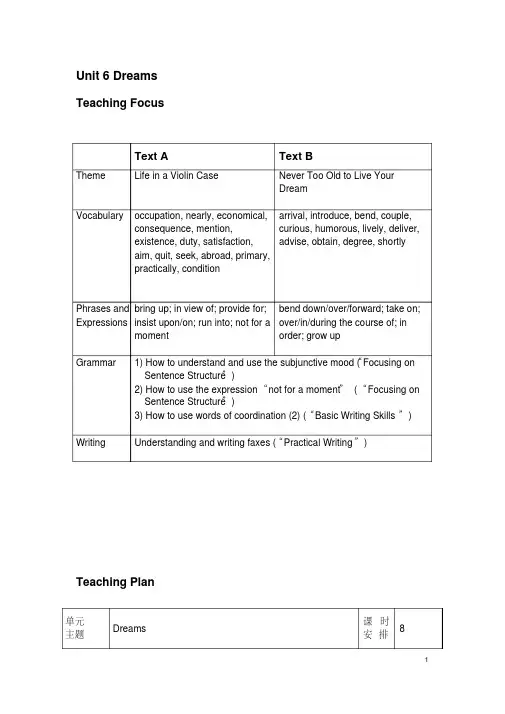
Unit 6 DreamsTeaching FocusText A Text BTheme Life in a Violin Case Never Too Old to Live YourDreamVocabulary occupation, nearly, economical,consequence, mention,existence, duty, satisfaction,aim, quit, seek, abroad, primary,practically, condition arrival, introduce, bend, couple, curious, humorous, lively, deliver, advise, obtain, degree, shortlyPhrases and Expressions bring up; in view of; provide for;insist upon/on; run into; not for amomentbend down/over/forward; take on;over/in/during the course of; inorder; grow upGrammar 1) How to understand and use the subjunctive mood (“Focusing on Sentence Structure”)2) How to use the expression “not for a moment”(“Focusing onSentence Structure”)3) How to use words of coordination (2) (“Basic Writing Skills”) Writing Understanding and writing faxes (“Practical Writing”)Teaching Plan单元主题Dreams课时安排8教育教学目标(学生) To recall all the things you do apart from studying up to now and try to find the real dream you want to pursue for your whole life.To make yourself a plan of a life-long study.To be familiar with the context meaning and the use of those vocabulary of the two texts listed in the above table.To be familiar with the collocation of those phrases and expressions listed in the above table.To be able to make sentences with s peak poorly of, as a consequence of, get... out of, little by little.To be able to rewrite sentences after models, using the subjunctive mood or the expression “not for a moment”.To learn some rules of using coordinating conjunctions.To be able to understand and write faxes.教学设计教学内容Section AText A: Life in a Violin CaseSection BText B: Never Too Old to Live Your DreamSection CPractical Writing: Understanding and writing faxes教学活动安排建议Leading In and Exploring the TopicAllow the Ss 5 minutes to finish the listening exercise in Exploring the Topic.Divide the class into two groups and ask them to debate the following two topics:1) There are jobs that may be interesting, but you cannot earnmuch money doing such jobs.2)For the benefit of their children, parents should advisethem to choose a job that pays well rather than a job thatthey are interested in.Section A Reading ThroughPrepare a PPT with all the new words and expressions of TextA. Familiarize the class with all of them.Ask the Ss to read the text one by one, each one reading one paragraph. Help the Ss with their pronunciation and intonation.Ask the students to work in pairs, one reading the text paragraph by paragraph and the other interpreting what his partner reads.Highlight some difficult sentences and elicit explanations from students, giving helps where necessary.Ask some pairs to share their pair work with the class to check the Ss understanding of the text.Basic Writing SkillsPrepare a PPT with sentences of the exercise on P108of SB.Ask some students to tell their answers to the class and explain why.Check the understanding of the class by explaining the examples given on P108 of SB.Section B Reading MoreAsk the students to go through the text and find the answers to the following questions:1) How old is Rose?2) Why is Rose in college at such an old age?3) What kind of person is Rose?4) According to Rose, what are the two secrets to stayingyoung, being happy and achieving success?5) What can we learn from Rose?Ask some students to share their answers with the whole class and give helps where necessary.Ask the Ss to work in groups and discuss the following questions:1) Do you know anyone like Rose?2) Do you know any young or middle-aged people quit theirjobs to further their education, or anyone who keep theirfull-time jobs but enroll in various part-time programs?3) What makes them go back to school many years aftergraduation?4) What do you think is the significance of life education andcontinuing education?5) Do you think you will go back to school for furthereducation after graduation?Section C Practical WritingGuide the students to finish the three exercises on P114 to P116 of SB according to the samples given.Search a Chinese fax online and translate it into English.课后学习设计作业Finish all the exercises in Unit Six.Read the passage in Reading Out on Page 104 of SB and recite it. Make yourself a life-long study plan.Search a Chinese fax online and translate it into English.课后总结与反思。
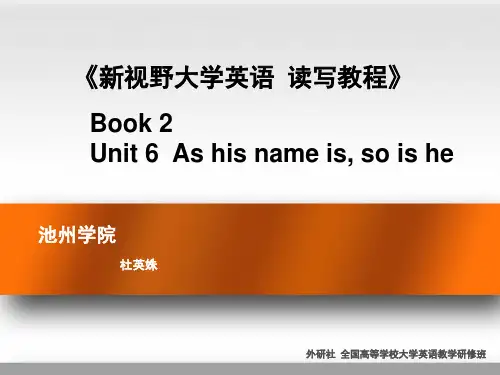
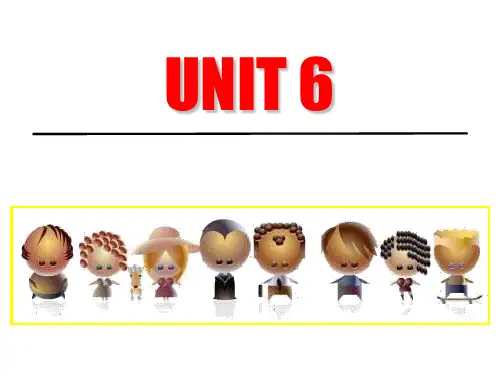

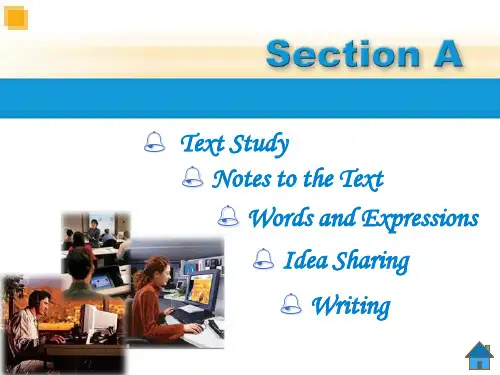
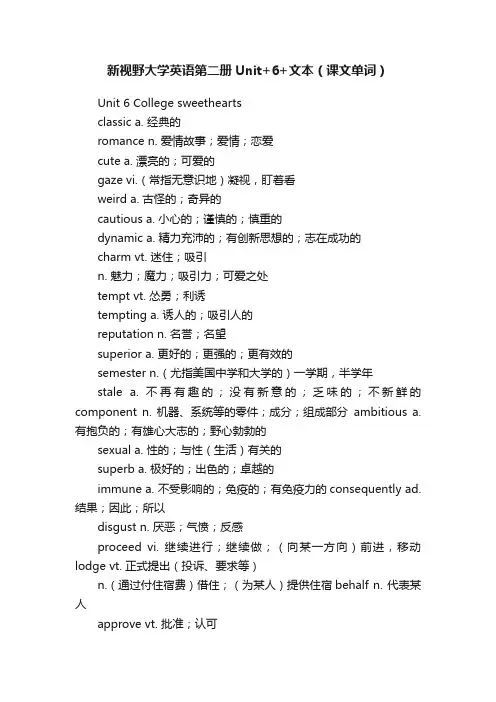
新视野大学英语第二册Unit+6+文本(课文单词)Unit 6 College sweetheartsclassic a. 经典的romance n. 爱情故事;爱情;恋爱cute a. 漂亮的;可爱的gaze vi.(常指无意识地)凝视,盯着看weird a. 古怪的;奇异的cautious a. 小心的;谨慎的;慎重的dynamic a. 精力充沛的;有创新思想的;志在成功的charm vt. 迷住;吸引n. 魅力;魔力;吸引力;可爱之处tempt vt. 怂勇;利诱tempting a. 诱人的;吸引人的reputation n. 名誉;名望superior a. 更好的;更强的;更有效的semester n.(尤指美国中学和大学的)一学期,半学年stale a. 不再有趣的;没有新意的;乏味的;不新鲜的component n. 机器、系统等的零件;成分;组成部分ambitious a. 有抱负的;有雄心大志的;野心勃勃的sexual a. 性的;与性(生活)有关的superb a. 极好的;出色的;卓越的immune a. 不受影响的;免疫的;有免疫力的consequently ad. 结果;因此;所以disgust n. 厌恶;气愤;反感proceed vi. 继续进行;继续做;(向某一方向)前进,移动lodge vt. 正式提出(投诉、要求等)n.(通过付住宿费)借住;(为某人)提供住宿behalf n. 代表某人approve vt. 批准;认可vi. 赞许;赞成;同意grant vt. 给予;准予n. (尤指政府发给的)补助金,拨款coordinate vt. 调节;协调core n. 最重要(或最基本)的部分;核心deserve vt. 应得,应受到(奖赏或惩罚);(建议、观点或计划)值得考虑liberty n. 擅自的行为;冒犯的举动;放肆的行为;自由;自由权display vt. 显示,显露(某种情感、态度或特质)n. 展览;陈列;展示disapprove vi. 不赞同;反对palm n. 棕榈树weave v. 编造(故事等);织;编织blur n. 模糊的记忆;记不清的事情v. (使)模糊;(使)看不清kneel vi. 跪着;跪下propose v. (尤指正式向某人)求婚vt. 提议;建议confess v. 承认(使自己尴尬的事情)knot n. (线、绳、布等打成的)结;(恐惧、愤怒等导致的)紧张(感)pessimistic a. 悲观的;悲观主义的faithful a.(对某人、信念、政党等)忠诚的,忠实的honeymoon n. 蜜月commence v. 开始;着手bloom vi. 开花;(花)盛开Phrases and expressions:head for (朝...)前进;(向...)去gaze at(常指无意识地)凝视,盯着看stare at凝视,盯着看by accident偶然;意外地pretend to do sth.假装...;装作...come over sb. (某种感情)突然攫住,突然影响immune to 不受...影响的;对...有免疫力的go along with sb./sth.同意;支持expel sb. from sth. (从学校或组织中正式)开除proceed to sth. 进而做(参加)某事(活动)take the liberty of doing sth. 擅自做某事take sb. by surprise出乎某人意料propose marriage 求婚be filled with充满;装满tie the knot 结婚be pessimistic about 对...持悲观看法(意见)College sweethearts1. I smile at my two lovely daughters and they seem so much more mature than we, their parents, when we were college sweethearts. Linda, who’s 21, had a boyfriend in her freshman year she thought she would marry, but they’re not together anymore. Melissa, who’s 19, hasn’t had a steady boyfriend yet. My daughters wond er when they will meet “The One”, their great love. They think their father and I had a classic fairy-tale romance heading for marriage from the outset. Perhaps, they’re right but it didn’t seem so at the time. In a way, love just happens when you least expect it. Who would have thought that Butch and I would end up getting married to each other? He became my boyfriend because of my shallow agenda: I wanted a cute boyfriend!2. We met through my college roommate at the university cafeteria. That fateful night,I was merely curious, but for him I think it was love at first sight. “You have beautiful eyes,” he said as he gazed at my face.He kept staring at me all night long. I really wasn’t that interested for two reasons. First, he looked like he was a really wild boy, maybe even dangerous. Second, although he was very cute, he seemed a little weird.3. Riding on his bicycle, he’d ride past my dorm as if “by accident” and pretend to be surprised to see me. I liked the attention but was cautious about his wild, dynamic personality. He had a charming way with words which would charm any girl. Fear came over me when I started to fall in love. His exciting “bad boy image” was just too tempting to resist. What was it that attracted me? I always had an excellent reputation. My concentration was solely on my studies to get superior grades. But for what? College is supposed to be a time of great learning and also some fun. I had nearly achieved a great education, and graduation was just one semester away. But I hadn’t had any fun; my life was stale with no component of fun! I needed a boyfriend. Notjust any boyfriend. He had to be cute. My goal that semester became: Be ambitious and grab the cutest boyfriend I can find.4. I worried what he’d think of me. True, we live d in a time when a dramatic shift in sexual attitudes was taking place, but I was a traditional girl who wasn’t ready for the new ways that seemed common on campus. Butch looked superb! I was not immune to his personality, but I was scared. The night when he announced to the world that I was his girlfriend, I went along with him. And then I suddenly thought: “Oh my gosh! Am I his girlfriend? How did that happen?” Then he whispered sweet words in my ear and said, “I’m going to marry you one day and I will be a lawyer. You will see.”5. I was laughing inside and said to myself, “I’d never marrythis guy. He’s a rebel without a good future. He’s my boyfriend because I hate my boring student life. I just want to have fun.”6. Sure enough, the following month, I found out he had failed all his courses. Consequently, he was going to be expelled from the university. To my disgust, he seemed resigned to his fate.I knew there was hope, so I led him to the college secretary for reconsideration.7. “You are going to graduate with a BA in political science from UPenn and proceed to the College of Law,”I told him, lodging an appeal on his behalf, which was approved. Butch was granted reconsideration. And, once we became steadies, he coordinated his studies and social life, passing all of his classes. He eventually studied law.8. Despite Butch’s somewhat wild character, at his core, he is always a perfect gentleman and deserves a lot of credit for that. True, he’d sometimes take the liberty of displaying his love by planting a kiss on my lips right in front of my astonished friends who watched and disapproved. But the truth is we had a pure and responsible relationship for seven full years. Sitting by the palm trees, hand in hand, we would listen to romantic songs, watch the sunset, and weave dreams of being together with children of our own, forever.9. Two years passed in a blur. One day, Butch took me by surprise as he knelt down and proposed marriage holding a dozen red roses! Filled with deep emotion, I confessed my love for him, “How roooomaaaantic!!” Then my brain woke up from fantasy land. I cried out, “Good heavens. No! We’re too young to tie the knot. We haven’t even graduated from college yet!”I really loved him but was pessimistic about our chances for success.10. We married five years later.11. Our faithful journey of love and learning took us down rocky roads of hardship and on smooth easy-going highways. It is a long, romantic, sometimes crazy, lovestory that sums up a 29-year long honeymoon together as a couple who are still madly in love with each other. Our love commenced with a casual attraction but bloomed into a mature love and rich life.。
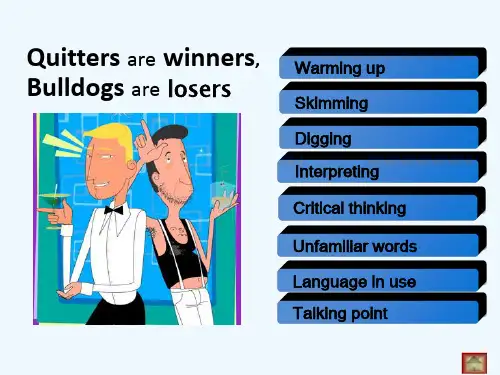
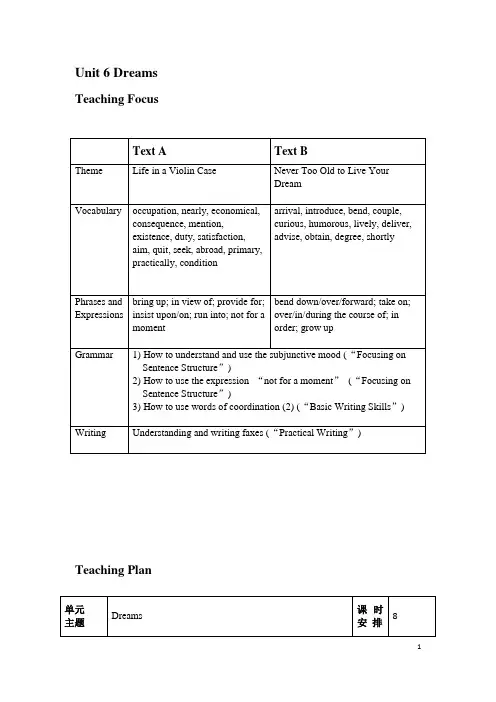
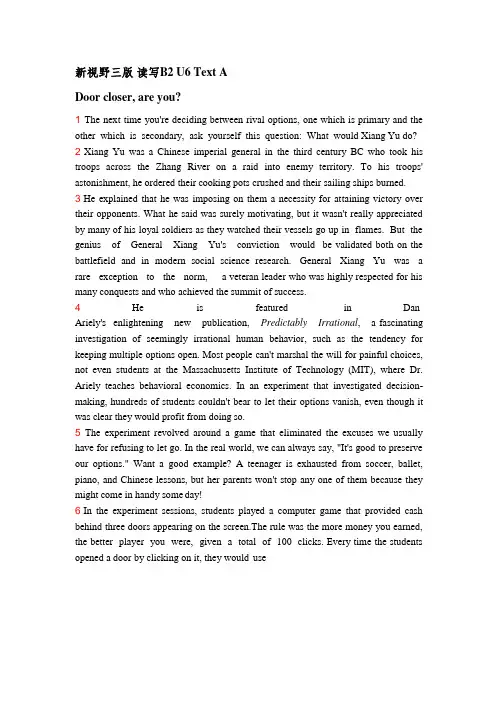
新视野三版读写B2 U6 Text ADoor closer, are you?1 The next time you're deciding between rival options, one which is primary and the other which is secondary, ask yourself this question: What would Xiang Yu do?2 Xiang Yu was a Chinese imperial general in the third century BC who took his troops across the Zhang River on a raid into enemy territory. To his troops' astonishment, he ordered their cooking pots crushed and their sailing ships burned.3 He explained that he was imposing on them a necessity for attaining victory over their opponents. What he said was surely motivating, but it wasn't really appreciated by many of his loyal soldiers as they watched their vessels go up in flames. But the genius of General Xiang Yu's conviction would be validated both on the battlefield and in modern social science research. General Xiang Yu was a rare exception to the norm, a veteran leader who was highly respected for his many conquests and who achieved the summit of success.4 He is featured in Dan Ariely's enlightening new publication, Predictably Irrational, a fascinating investigation of seemingly irrational human behavior, such as the tendency for keeping multiple options open. Most people can't marshal the will for painful choices, not even students at the Massachusetts Institute of Technology (MIT), where Dr. Ariely teaches behavioral economics. In an experiment that investigated decision-making, hundreds of students couldn't bear to let their options vanish, even though it was clear they would profit from doing so.5 The experiment revolved around a game that eliminated the excuses we usually have for refusing to let go. In the real world, we can always say, "It's good to preserve our options." Want a good example? A teenager is exhausted from soccer, ballet, piano, and Chinese lessons, but her parents won't stop any one of them because they might come in handy some day!6 In the experiment sessions, students played a computer game that provided cash behind three doors appearing on the screen.The rule was the more money you earned, the better player you were, given a total of 100 clicks. Every time the students opened a door by clicking on it, they would useup one click but wouldn't get any money. However, each subsequent click on that door would earn a fluctuating sum of money, with one door always revealing more money than the others. The important part of the rule was each door switch, though having no cash value, would also use up one of the 100 clicks. Therefore, the winning strategy was to quickly check all the doors and keep clicking on the one with the seemingly highest rewards.7 While playing the game, students noticed a modified visual element: Any door left un-clicked for a short while would shrink in size and vanish. Since they already understood the game, they should have ignored the vanishing doors. Nevertheless, they hurried to click on the lesser doors before they vanished, trying to keep them open. As a result, they wasted so many clicks rushing back to the vanishing doors that they lost money in the end. Why were the students so attached to the lesser doors? They would probably protest that they were clinging to the doors to keep future options open, but, according to Dr. Ariely, that isn't the true factor.8 Instead of the excuse to maintain future options open, underneath it all the students' desire was to avoid the immediate, though temporary, pain of watching options close. "Closing a door on an option is experienced as a loss, and people are willing to pay a big price to avoid the emotion of loss," Dr. Ariely says. In the experiment, the price was easily measured in lost cash. In life, the corresponding costs are often less obvious such as wasted time or missed opportunities.9 "Sometimes these doors are closing too slowly for us to see them vanishing," Dr. Ariely writes. "We may work more hours at our jobs without realizing that the childhood of our sons and daughters is slipping away."10 So, what can be done to restore balance in our lives? One answer, Dr. Ariely says, is to implement more prohibitions on overbooking. We can work to reduce options on our own, delegating tasks to others and even giving away ideas for others to pursue. He points to marriage as an example, "In marriage, we create a situation where we promise ourselves not to keep options open. We close doors and announce to others we've closed doors."11 Since conducting the door experiment, Dr. Ariely says he has made a conscious effort to lessen his load. He urges the rest of us to resign from committees, prune holiday card lists, rethink hobbies and remember the lessons of door closers like Xiang Yu.12 In other words, Dr. Ariely is encouraging us to discard those things that seem to have outward merit in favor of those things that actually enrich ourlives. We are naturally prejudiced to believe that more is better, but Dr. Ariely's research provides a dose of reality that strongly suggests otherwise.13 What price do we pay for trying to have more and more in life? What pleasure and satisfaction can be derived from focusing our energy and attention in a more concentrated fashion? Surely, we will have our respective answers.14 Consider these important questions: Will we have more by always increasing options or will we have more with fewer, carefully chosen options? What doors should we close in order to allow the right windows of opportunity and happiness to open?Language Points:1 The next time you’re deciding between rival options, one which is primary and the other which is secondary, ask yourself this question: What would Xiang Yu do? (Para. 1) Meaning: The next time when you are to make a choice between two competing options, youhave to distinguish which is the primary one and which is the minor one. To be enlightened, you can ask yourself what option Xiang Yu would choose.Meaning beyond words: It suggests that Xiang Yu was a wonderful decision-maker. Note: The phrase rival options means that both options seem like good choices, but one choice is somewhat better than the other. In this case, it is the one that Xiang Yu chose to implement.2 Xiang Yu was a Chinese imperial general in the third century BC who took his troops across the Zhang River on a raid into enemy territory. (Para. 2)Meaning: Xiang Yu was an ancient Chinese general in the third century BC. He led his troops across the Zhang River to attack the enemy in its territory.3 To his troops’ astonishment, he ordered their cooking pots crushed and their sailingships burned. (Para. 2)Meaning beyond words: To make sure his troops would win the battle quickly, Xiang Yu ordered the soldiers to crush their cooking pots and burn their sailing boats after he led his troops across the Zhang River to attack the enemy. This way, he closed the door for retreat ing from the enemy’s territory and sent out a clear message to his men that they only had two choices: to win the battle or die in the battle. However, his decision was obviously against normal practice, which greatly shocked his troops.4 He explained that he was imposing on them a necessity for attaining victory over their opponents. (Para. 3)Meaning beyond words: By having their cooking pots crushed and their sailing ships burned, Xiang Yu put his troops in such a desperate condition that they wouldn’t have any hope to escape but fight to survive and eventually win the battle. In other words, Xiang Yu gave his troops only one option. Usage note: rival, opponentrival 和 opponent 都可以用作名词,都可以表示“ 对手”,但两者有区别。